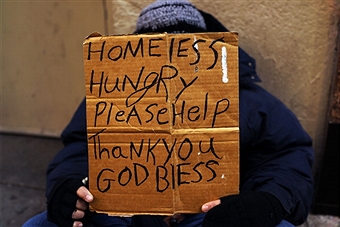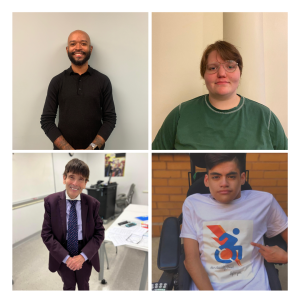Symantha Lancaster has big goals.
“What I’m looking for is a career path,” she said.
The upbeat and cheerful Chicago native is a student at The Cara Program, a non-profit organization that offers job training and placement for individuals affected by homelessness and poverty.
Lancaster, who joined the program in September, said she has a degree in teaching but was unable to find employment. This led to a cycle of poverty that has impacted her ability to provide for herself.
said she has a degree in teaching but was unable to find employment. This led to a cycle of poverty that has impacted her ability to provide for herself.
She was eventually referred to The Cara Program and now she is getting closer to finding employment.
“Our ultimate goal is to help somebody who’s in our program find a full-time, quality, permanent placement,” said Beth Lye, Cara’s Individual Giving manager.
“We’ll help over 300 people find that job this year.”
Lancaster is just one of many poor and homeless Chicagoans. Chicago is the third largest city in the U.S. and has one of the highest populations of struggling people.
An analysis by the Chicago Coalition for the Homeless (CCH) estimates that 125,848 Chicagoans were homeless during the 2014-15 school year, and 20,205 homeless students were identified by Chicago Public Schools (CPS).
Homelessness, poverty, and unemployment in Chicago are all connected, making the solution to each problem hard to pinpoint. Experts say that in order to fix one area the others must be reformed as well.
“It’s got to be a multi-faceted approach to solving the problem,” said Jeremy Bergstrom, senior staff attorney at Sargent Shriver National Center on Poverty Law.
Brock Grosso, housing organizer at Access Living, said the main reason for these social problems is because CPS, the Chicago Police Department (CPD) and the Chicago Housing Authority (CHA) are all under the single authority of Mayor Rahm Emanuel, and all three agencies are broken.
“Every single one of those agencies disproportionately serves and interacts with low- income people and people of color in the city,” Grosso said.
Bergstrom added that it is impossible to separate race from poverty and the lack of generational wealth among minorities makes it harder for them to break the poverty cycle.
Minorities, especially black people, suffer at a higher rate than white people, which is reflected in the number of homeless individuals in each demographic group, Bergstrom said.
Every two years, the city of Chicago performs a point-in-time (PIT) search, which provides a snapshot of the homeless population in the city. According to the 2015 PIT search, the racial demographic of the homeless population living in city shelters was 76 percent African American, 11 percent white, 10 percent Latino, and 3 percent other.
“In order to address these super huge systemic historical things, we need people who are making decisions about how resources are distributed; to be making difficult decisions that benefit low-income people and people of color in the city,” Grosso said.
“Right now they are across the board not doing that.”
Most often, the first step in reducing homelessness, poverty and unemployment, is addressing homelessness.
Spencer Cowan, senior vice president for research at the Woodstock Institute, said many studies show adequate housing is the common denominator of many issues related to poverty.
“Studies show that when you provide stable housing, a stable physical location, the rest of those elements have a better chance of coming into place,” Cowan said.
“When people are housed, they have a better chance of seeing their education through and finding employment.”
However, according to the CCH, in order to address the need for more subsidized homes, the CHA needs to undergo reform.
A CHA financial report for the fiscal year of 2012 revealed CHA is sitting on a cash surplus of more than $432 million. That was more than Chicago’s 2014 budget deficit.
CHA gained this surplus by distributing 13,500 fewer housing vouchers than the U.S. Department of Housing and Urban Development (HUD) provided them to fund low-income housing.
Despite the lack of issued vouchers, tens of thousands of families languish on CHA’s waiting list for low-income housing while other families are removed from the list entirely.
“One of the big issues in Chicago has been that housing authorities are allowed to purge their waitlists when they lose contact with people that are on the waitlist,” Bergstrom said.
The ability of CHA to remove people who they can’t contact has an especially harsh impact on homeless families, who often do not have access to a stable phone or permanent mailing address, disqualifying those who need housing the most.
Bergstrom said the city needs to make sure that homeless people are not purged from waitlists and must also create ways to contact families once their name comes up on the list. This will help CHA dole out its surplus to those in need.
“It’s good policy to ensure that money that is intended to be spent housing people, indeed, is spent on that, and that it’s done so efficiently and justly,” Bergstrom said.
Fixing the housing problem solves more than just the homeless issue.
Cowan noted medical treatment also becomes easier when housing is provided because people who have proper housing are likelier to visit a regular doctor’s office instead of the ER, and they can plan for hospital trips. This is especially beneficial for people with mental illnesses.
“The numbers of homeless that have mental health issues are enormous,” Cowan said.
The benefit of adequate housing provide social workers with the ability to reach out and find their patients and they are able to work with them over a longer period of time. This leads to less criminal court intervention and incarceration of the mentally ill.
Loss of a spouse, loss of a job and domestic violence are three common factors that can lead to homelessness.
These issues are exacerbated when systemic and generational poverty is factored in.
Poor people, Cowan said, can’t afford to make a mistake or have the unexpected happen to them. Even minor accidents, like a head injury, can land people in a situation where they cannot provide for themselves and their families.
“If you start poor, and you make a mistake, you don’t get away with it,” Cowan said.
For those who don’t have employment, regaining stability is even harder. A large majority of homeless individuals do not have the means to obtain a job. They lack the proper clothing, need resume assistance or don’t have reliable transportation.
But even with all these issues, Cowan said, Chicago has the ability to make a positive change in the lives of it’s citizens.
“We as a society can afford to reduce the number of people who have [poverty] as a problem.”

















Be First to Comment